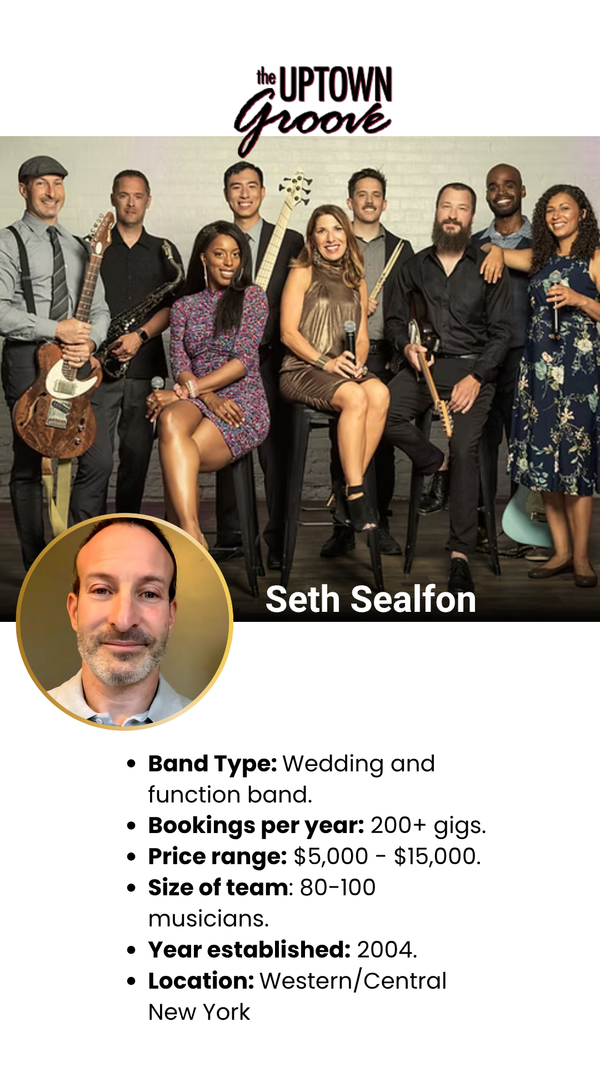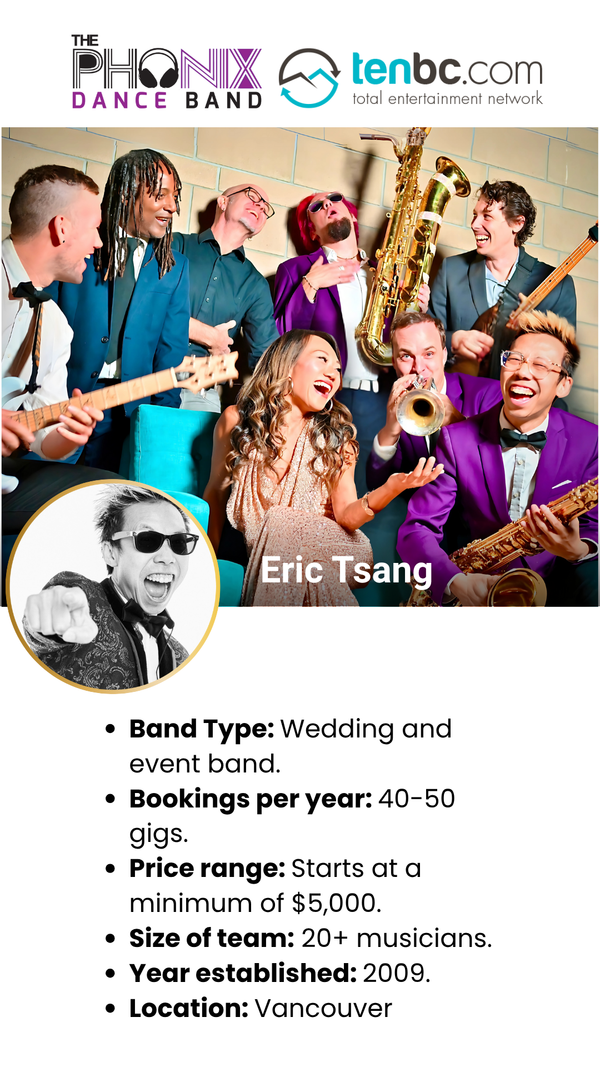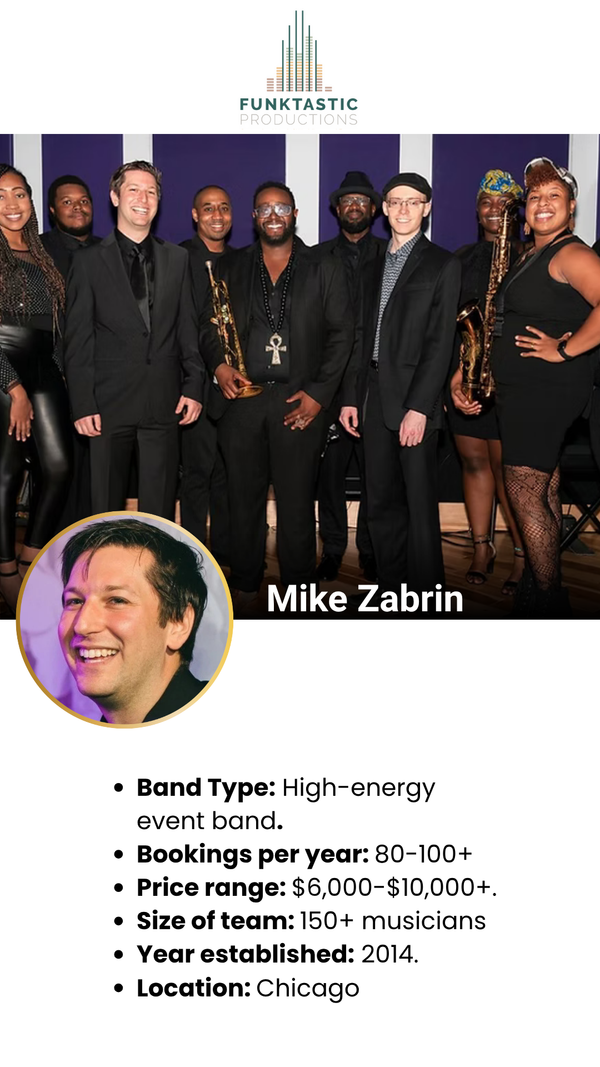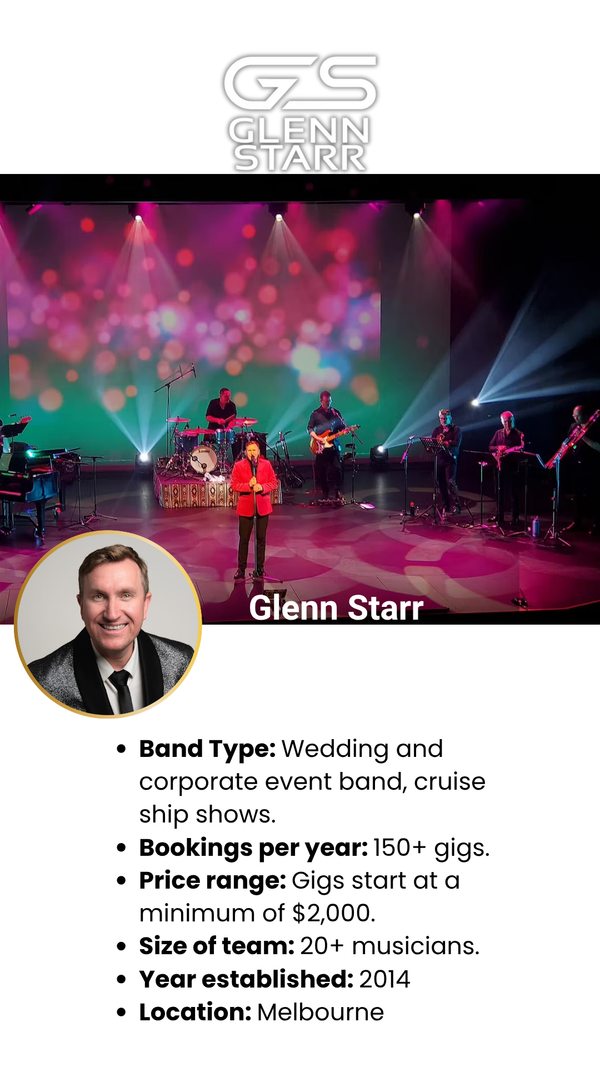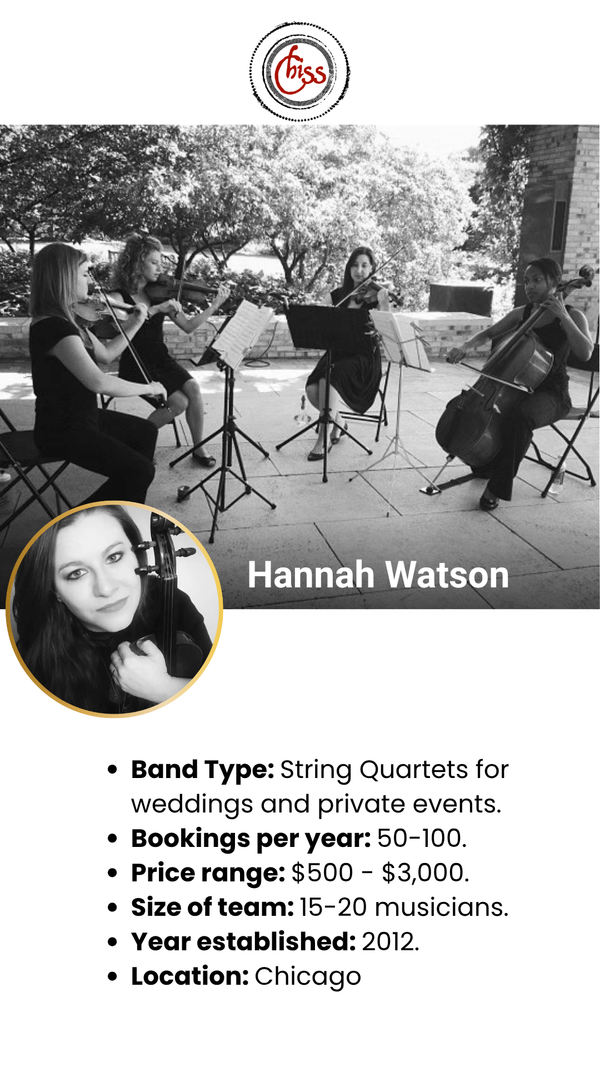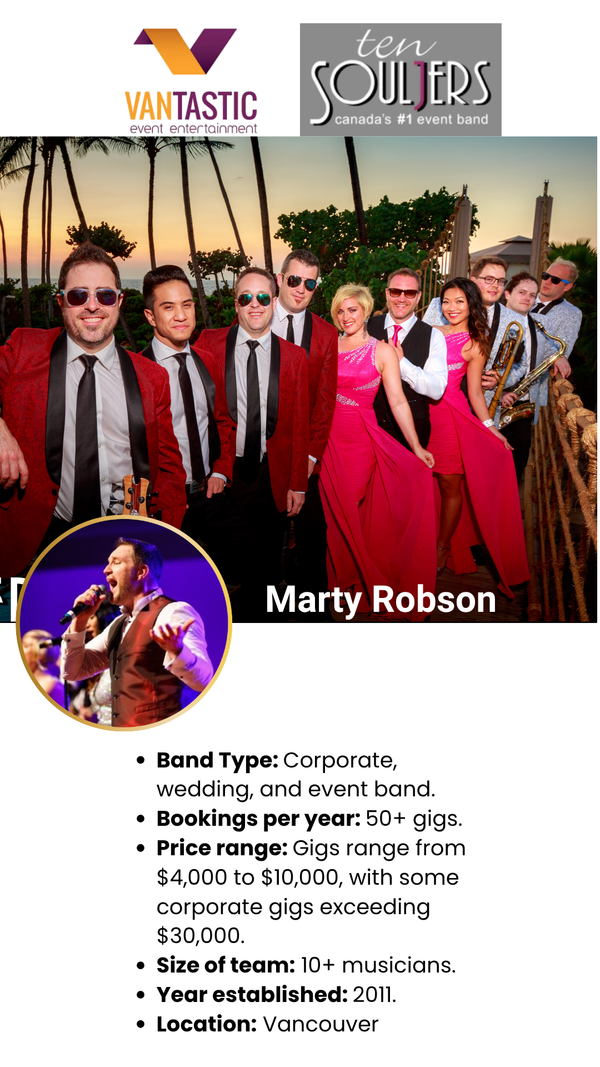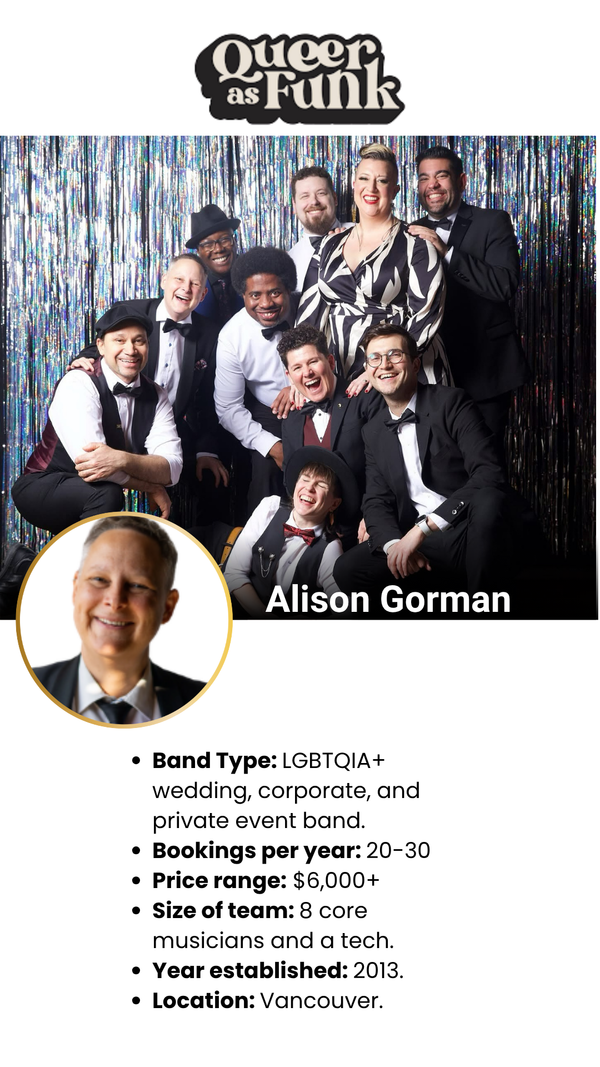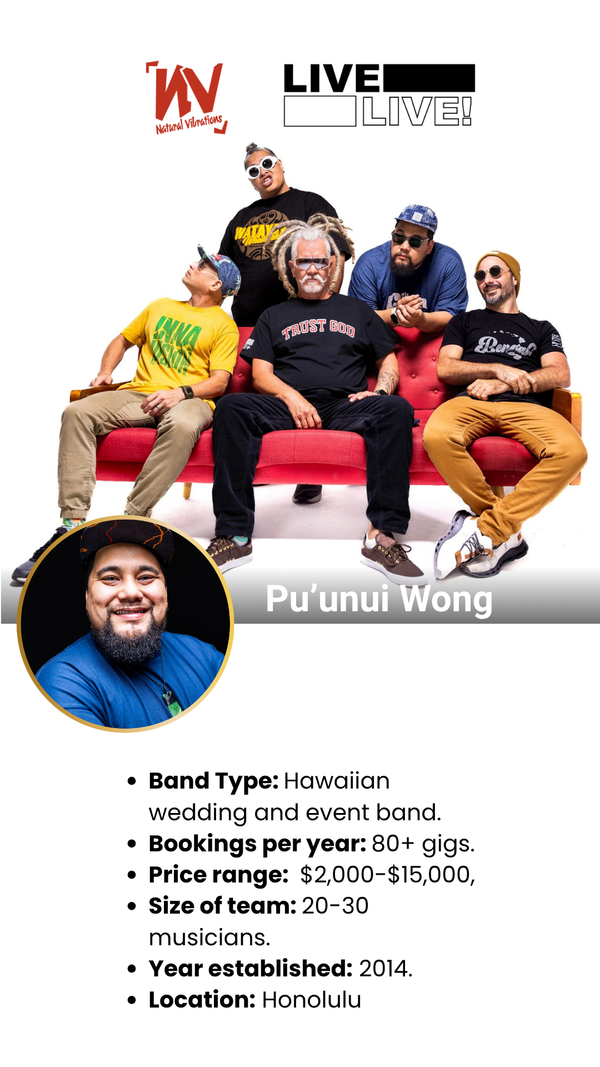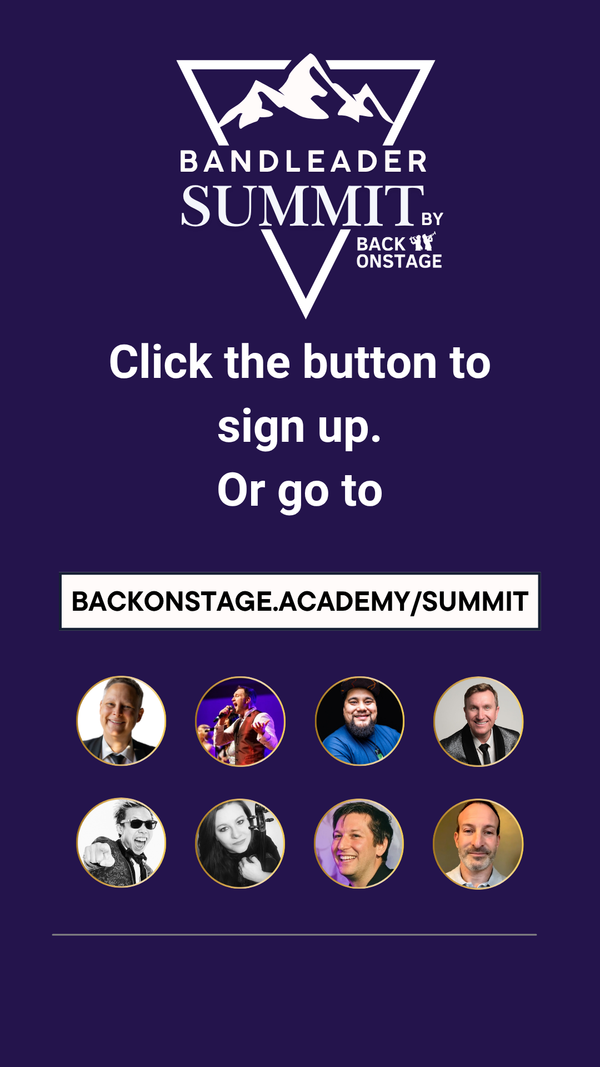How To Make Money With Music - Start a Live Music Service Business

Are you a talented musician wondering if it's possible to turn your passion into a sustainable profession? Well, we'll be taking a deep dive into one of the most common ways that musicians make money and sharing valuable insights to help aspiring musicians like you navigate their path to success through what we call live music service businesses.
Before we further explore the topic, I wanted to share something interesting I came across while researching for this video. I found a great article called, "18 Ways to Make Money as a Jazz Musician", on LearnJazzStandards.com. It provides a lot of cool ideas on how to approach different aspects of the business. I recommend checking it out for more inspiration. While there are many ideas in the article, today we will focus on starting a band and what jazz musicians refer to as "pop gigs."
On this page:
Let's take a look into the topic at hand: live music service businesses.
What Is A Live Music Service Business?
To begin, let's define the live music services industry. In our view, the music industry can be divided into two main camps: the live music service industry and original music artists.

The live music service business involves individuals or groups providing entertainment for hire, often performing well-known songs at events, weddings, restaurants, pubs, clubs, lounges, and similar venues. It includes a single contractual relationship with usually one client. They hire you to perform for a specific period of time, and once the job is done, you receive payment and go home. That's a very different perspective from a business model standpoint.
Original music artists perform their own original music. Examples include Ed Sheeran and Bruno Mars. They go on tours, sell merchandise, and do everything they can to gather as many fans as possible. It's all about building a dedicated fanbase.
Our focus is on the live music service business. This industry consists of individuals and businesses that provide services for hire within the music industry. They often perform well-known songs at various venues, such as events, weddings, restaurants, and clubs. This model, where musicians play other people's music, has been around for a long time and is considered one of the oldest and most established ways to make a living as a musician.
If we look back to the days of Mozart, when musical instruments were first organized into large groups, we can see the roots of this approach. There was really only one composer and then you'd have 70 people playing the same piece of music who are all just musicians.
In the music industry, I find that we kind of have this notion where you tell someone you're a musician or you're in a band, and they immediately think, “Oh, well, this person is really creative. It's all they do every day as they show up and they're just 110% creative”. The reality is, that's not the reality for most musicians and that's totally okay.
You don't have to be an overwhelmingly creative force to be a musician. Consider any other profession out there. For example, bankers aren't expected to arrive at work every day and completely revolutionize the industry with their innovative spreadsheets or dreamt-up mortgage manuals. Instead, they follow established procedures and apply the knowledge they acquired through education. Many musicians operate in a similar manner.
You can achieve success as a musician by performing other people's music without ever composing a single note of your own, and that's perfectly acceptable.
That's precisely what we're discussing today, and I can speak from personal experience on this matter.
Our Story

Back in 2009, I took the initiative to start my own band. It was a group of ten friends who came together to play music, and we had an ambitious plan. Like many bands, our initial goal was to become rich and famous by playing our own music and touring the world. We decided to start by playing in casinos, thinking it would be a lucrative opportunity. Even though we discovered that playing in casinos didn't yield as much money as we had hoped, we remained determined.
As we played in casinos, we simultaneously worked on our original music, aiming to have a complete set ready for touring. However, our plans for instant fame and fortune didn't materialize. Instead, we found ourselves performing at weddings, which turned out to be a lot of fun. This led to more wedding gigs and eventually established us as a regular house band at a local bar. We were thoroughly enjoying playing music together, even though we weren't focused on songwriting.
Fast forward ten years, and our journey had transformed us into a full-fledged entertainment company. We have expanded our offerings to include various options for bands and musicians. In addition to that, we now provide photo booths, production services, and sound and lighting services. Our company has grown into a significant entity capable of offering a wide range of services. Surprisingly, we haven't ventured into creating original material, but we have utilized our creative skills in many other ways. As you can see, building a business requires a great deal of creativity. That's our story in a nutshell.
Advantages of Playing Other People’s Music

Playing other people's music offers several advantages. One of them is that you don't have to engage in extensive travel and touring. Not everyone is suited for a life on the road, constantly changing beds, hotels, and time zones can take a toll on your body. It can be especially challenging if you have a family that you need to be away from for extended periods of three or four months in a year. This lifestyle is not for everyone.
In the service industry, playing other people's music provides a more predictable income and regular paychecks. By staying local, you can take advantage of year-round events and the constant presence of open restaurants. In contrast, relying solely on touring for three or four months a year and hoping for the best during the rest of the time can be tough. While it may not lead to riches and fame, it is possible to make a decent living through this approach.
Another fascinating benefit is that learning hit songs, which becomes a significant part of this side of the industry, offers valuable insights into music. When you're tasked with transcribing your own part for a gig or responsible for creating charts and transcribing the entire song for the band, you gain extensive knowledge. It's akin to returning to school, as you delve deep into these tunes, unraveling their intricacies, and understanding their composition. This process can greatly inform you as a songwriter and musician, should you choose to pursue that path in the future.
Once again, we return to the topic of exploring avenues to make money in the music industry, particularly through the concept of starting a live music service business.
Why Should I Identify as a Live Music Service Business?
So, what exactly do we mean by "live music services"? These can encompass various types of musical groups, such as cover bands, tribute bands, string ensembles, or bands with a specific purpose or theme. I strongly encourage using the term "service" when discussing these offerings. Let me explain why.

Imagine you're reaching out to a company to inquire about booking a band for their Christmas party. If you introduce yourself as a member of the John Smith Band and ask if they hire or need a band for their event, the word "band" can be quite generic. Each person has their own internal perception of what a band represents to them. The person you're speaking to on the phone might envision a casual scenario where friends gather in a basement every Tuesday night, jamming tunes, having fun, and occasionally playing gigs for friends. It's an informal, recreational activity that doesn't resemble a professional business.
When you identify yourself as a band, that person automatically applies their preconceived notion of what a band is to your situation. As a result, this misalignment hinders your professional presentation. You want to portray yourself as a dedicated and reliable entity that can deliver a professional service tailored to their needs.
It's crucial to emphasize the service aspect of your musical offering. By positioning yourself as a live music service business, you convey the professionalism, expertise, and commitment to providing a tailored experience for your clients. This distinction sets you apart and ensures that potential clients perceive you as a reliable and capable provider.
Using the term "band" alone doesn't effectively communicate this. Using the term, “live music service”, gives you the opportunity to define the term for them as it’s not widely used… yet.
This becomes a huge advantage because you can offer different types of services such as a 10-piece dance band, photo booths, sound production and lighting, etc… You’re able to emphasize that your services aren’t limited to music-related activities, but other activities as well like speeches.
Your services become more valuable as you become a big asset for them, and this can lead to more bookings because your company can rank higher on their list of suppliers. So, the same client might call you when they require your services again in the future.
Identifying as a business also highlights your adaptability. You can listen to your clients and provide whatever they need. For example, if you’re talking to a wedding couple and they want to hire a band for their reception and they want a string ensemble for their ceremony, you’re able to say, “Oh, well, you know what? We have a string ensemble in our company. I will book that for you”. Meanwhile, you can go to your friend who you know runs the string ensemble and get them the gig. Obviously, you also reap the benefits by taking your cut in the middle as the agent or the booker for that gig.
That’s essentially how this industry works - you’re able to conglomerate all the services from all the individuals you know and sell them however you need to. If this isn’t your cup of tea, however, you can always join one of these bands or music ensembles! There are tons of clients out there just looking for an event entertainment cover band, etc.
Doing entertainment-for-hire is a very purpose-driven market, so you need to think about the spaces you’re trying to get involved with such as wedding ceremonies, cocktail hours, etc. Another aspect to think about is the type of music that is best-suited for that environment.
In summary, highlighting your role as a live music service business, rather than simply referring to yourself as a band, helps you present a more professional image and increases your chances of success in securing bookings.
How Much Money Can I Make As A Musician?
The next thing I want to discuss is one of the most important things you can do as a musician: think about what you need in order to make a living.
We're talking about income now—how much can you make as a musician?
First, you need to figure out how much you need. Llet’s do a little mental math.
Let's say, for example, that the rent in your city is $1,000 a month. That's $12,000 a year. As a general rule of thumb, your living expenses should not exceed 30% or a third of your income. So, if you're spending $12,000 a year on rent, you need to make at least $36,000 a year to get by.
Let's use that as a starting point. From there, you can work backwards and ask yourself, “How many gigs do I need to make up that income?”.
I can tell you that in this industry, for live music services, you're probably going to make anywhere from three to $600 on average for a gig. Typically, these are all-day gigs. You have to show up in the afternoon, do a soundcheck, maybe there's dinner, and then you perform all night. It is a long time commitment, but you are compensated fairly well for it.
For example, if I open up my calendar here, let's say I wanted to make $36,000 a year again. That's a question you've got to ask yourself and figure out what you need to be comfortable with. If I was going to divide that by the average amount a musician makes at one of these gigs, which is around $400, that gives me 90 gigs. So, I would need to be able to do 90 gigs a year to make my minimum income. That's a lot of gigs. It's about once every four days you've got to be doing a gig.
Hence, you need to ask yourself, "Is this realistic in your city? Is there enough work to be able to do that?" Of course, I would also recommend not putting all your eggs in one basket as a musician. If you're just going to bank on performing your entire income, it's probably going to be tough for you to branch out. Again, read that article I mentioned upfront. There are lots of good ideas in there for other things you can do to spread things out. But once you've figured that out, you're good to go.
I also wanted to share some statistics.

For this statistic, it comes from the USA census data, making it fairly accurate. They say musicians make, on average, $42,000 a year. However, it's important to note that this may not be the most precise number in the world since there is a wide range of incomes within the profession. Many musicians treat music as a side hustle while having a full-time job or engaging in several other activities.
Consequently, when it's time to report taxes, not all musicians categorize themselves as musicians on their tax forms. They might identify as servers, bankers, accountants, or other professions, with music being their side hustle.
Unfortunately, census data doesn't capture this aspect comprehensively because, as I mentioned, most people don't identify themselves solely as musicians. So, I would advise to take this information with a grain of salt. Use it as needed, but keep in mind the limitations of the US Census data.

Here on Back On Stage, we've got a ton of these live music service businesses using our software namely bands, DJs, larger entertainment companies, and so on. We took an average of what these live music service businesses make in a year, and it came around to $150,000. Keep in mind that there’s a considerable amount of range with these numbers; some companies make $30,000 to $50,000 a year while some make $1,000,000 to $2,000,000. The range is quite broad, offering ample opportunities for both substantial success and a more casual, background involvement. There are numerous options available to you in this field.
The key takeaway I want to emphasize is that starting your own live music service business can be a fantastic way to make a living.
If you're going to be the owner or leader of this group, you can earn a substantial amount of money. As a starting point, you can charge $1000 or more per gig because of the extensive work you'll be doing, and you deserve to be compensated accordingly. However, you'll have to wear multiple hats as the owner. This is because you'll be the booker, the contractor, the musician, the CEO, and even an arranger, providing custom arrangements for gigs. You'll be responsible for curating the band's entire music library.
Additionally, you can take on roles such as learning sound engineering and lighting. You’ll also need to handle bookkeeping, accounting, and manage your social media presence such as promotional materials, generating content, and video editing. People need to see you in action before they book you, so you'll need compelling videos with excellent audio. All of these tasks require time and effort, and if you handle them in-house, be sure to pay yourself for your work.
On a personal note, I've personally taught myself these skills over the years, and it has become a lucrative side hustle for me.
The main point here is that you can certainly do well!
Recalling our previous example, if you aim to make $30,000 a year, it becomes much easier to reach that goal if you're able to secure gigs that pay $1,000 each. Now, you only need to do 36 gigs a year instead of 100 to meet your minimum income goal! As a musician, you will frequently find yourself wearing different hats. The key is to avoid wasting your time chasing after countless bookings.
From the Back On Stage data, we found that the average booking time for a band is around 3 hours. This consists of all the administrative tasks that are required in order to manage and secure a booking. These tasks include chasing your musicians around, doing the contracts and invoices with your clients, getting signatures, capturing payments, musician payouts, building a setlist, and more. It’s a very time-consuming effort which converts to a huge expense on your end by the end of the year.
Therefore, it’s important to be very mindful of how you’re spending your time. To help mitigate this challenge, invest in tools like Back On Stage to help you seamlessly manage your bookings.
Here's one of our example clients:

Previously, they used to spend approximately three hours per gig to set things up and organize their schedule. However, when they started using Back On Stage, they have managed to reduce this time to just about 15 minutes per gig. Prior to using the software, they were wasting nearly 300 administrative hours each year, which was a significant undertaking. With Back On Stage, they now save more than two and a half hours per gig.
Considering their calendar consisted of around 116 gigs last year and estimating an administrative cost of approximately $30 per hour, this previously resulted in an additional expense of $9,000 by the end of the year.
Therefore, it is crucial to carefully consider how you invest your time, as it holds great importance.
What Kind of Gigs Can I Get?
The final concept I want to address is the types of gigs that you can potentially get when entering into the live music service business space.

This is only the starting point, and the possibilities aren’t limited to these gigs. However, events like weddings are fantastic and could be very lucrative. The only caveat about wedding events is that they’re often seasonal with most weddings and outdoor events occurring in the summertime.
Corporate events can also be highly lucrative, though it's important to note that these clients can be quite selective and usually expect timely communication. So, it's crucial to stay on top of your game in that regard.
Other opportunities could also provide gig possibilities including private events, military events, government events, care homes, senior homes, and even occasions like birthday parties or Bar and Bat Mitzvahs. While it's relatively rare for this type of music ensemble, there is a possibility of getting hired for studio sessions, depending on your connections.
Festivals present an interesting prospect – It's highly unlikely for music festivals like Coachella to hire cover bands specifically, as it doesn't align with their brand. However, if you can find festivals that aren't primarily focused on music, such as harvest festivals or county fairs, where music serves to enhance the overall experience, they often seek well-known music acts like yours to entertain their crowds.
Similarly, smaller venues like clubs, pubs, bars, restaurants, lounges, hotels, and casinos heavily rely on the live music services industry. They seek music that guarantees to keep their patrons engaged, enjoying themselves, and participating in activities like drinking and dancing. It's essential to provide purpose-driven music that caters to that market. All of these options are available for you to explore.
I hope this helped you to kind of wrap your brain around the live music services industry and if that might be something you want to pursue as a musician or as a music company!






